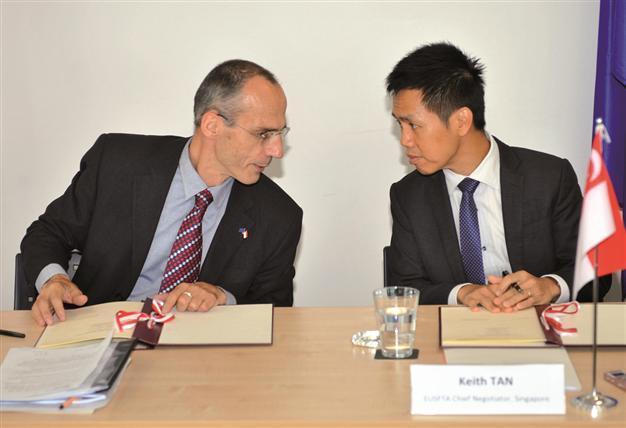European Union and Singapore finalize far-reaching trade deal
BRUSSELS/SINGAPORE - Reuters

EU chief negotiator Rupert Schlegelmilch (L) and Keith Tan (R), Singapore’s chief negotiator, chat during a media conference in Singapore on Sept 20. AFP photo
The European Union and Singapore submitted for approval on Sept. 20 one of the world’s most comprehensive free trade agreements, which the EU sees as a stepping stone towards a wider deal with Southeast Asia.
The European Union envisages it opening the door to a deal with other members of the 10-nation Association of Southeast Asian Nations (ASEAN), which has set a goal of economic integration by 2015.
“In the long term we want to have an agreement with all the 600 million ASEAN consumers and with all the countries of ASEAN and beyond, this is the first milestone,” Rupert Schlegelmilch, chief EU negotiator for the pact, said in Singapore where both sides initialed the roughly 1,000-page document.
Singapore has a population of just 5 million people but accounts for about a third of all EU-ASEAN trade, more than 60 percent of all investment between the two regions and is host to more than 9,000 European companies.
Trade in goods between the two topped 52 billion euros in 2012 and 28 billion euros in services in 2011. Mutual investment has reached 190 billion euros.
Singapore is one of the world’s biggest oil refining centers and the agreement will likely boost the export of petroleum products from Singapore to the EU because it will reduce tariffs, provided the refiners meet certain conditions.
The major refiners operating in Singapore are Royal Dutch Shell PLC and Exxon Mobil.
The agreement will also make it easier for European banks and insurers operating in Singapore to expand, potentially benefiting the retail businesses of Standard Chartered and HSBC as well as banks with wholesale operations such as Deutsche Bank AG and Barclays PLC.
It will ensure the right to sell directly or establish branches in each other’s markets and promises to provide greater transparency over the award of licenses.
“We made a very determined effort to go as far as we can in liberalizing further what our banks and insurances companies can do, we were quite successful in that respect,” said Schlegelmilch.
The deal goes beyond many other free trade accords in committing to open up public procurement, an area where the EU has many leading suppliers, and agreeing on technical standards in areas such as motor vehicles, electronics and green technologies.
A car made according to EU standards, for example, will be accepted for sale in Singapore.
Parma ham and pork flossThe European Union also gains better protection of “geographical indications”, region-specific products such as Parma ham or champagne. Singaporean delicacies such as pork floss and fish balls will be allowed to enter the EU tariff-free within an annual quota.
EU tariffs on virtually all items from Singapore will disappear over five years. Singapore has committed to its existing zero tariffs on EU imports.
Singapore is likely to benefit from reduced tariffs for pharmaceutical and petrochemical products. The EU and ASEAN launched free trade talks in 2007, but abandoned them two years later, the EU choosing instead to conduct bilateral talks with individual members.
The European Commission is already negotiating free trade accords with Malaysia and Vietnam and launched talks with Thailand in March.
Subject to approval in Singapore and by the 28 EU member states and the European Parliament, the agreement should enter into force in late 2014 or early 2015.
